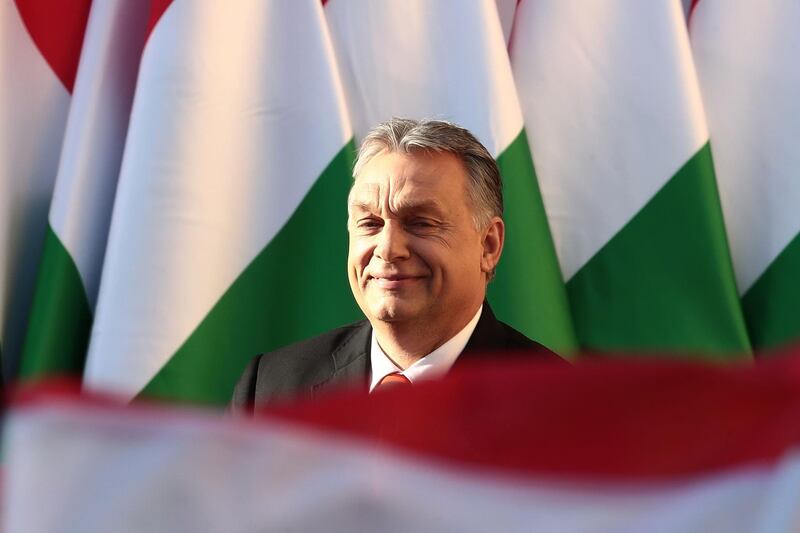Hungarian Prime Minister Viktor Orban, one of Europe's most controversial leaders, looks set to win a third consecutive term on Sunday, despite uncertainty over tactical voting and turnout that could trigger an upset.
At a final campaign event on Friday in the city of Szekesfehervar, south-west of Budapest, Mr Orban urged his supporters to turn out to vote.
"It's not enough to be ahead in the polls, we have to come first on voting day too," he said, recalling his party's loss in a 2002 election, at the end of his first term as prime minister, despite having been considered the favourite beforehand.
The nationalist leader's Fidesz party enjoys opinion poll leads of between 20 and 30 percentage points over its closest rival Jobbik, a far-right party led by Gabor Vona that has been moving towards the centre, and the leftist Socialists with their candidate Gergely Karacsony.
The first results are expected within hours of the polls closing at 17.00GMT (8pm UAE time) on Sunday, with broader trends emerging slowly over the course of the evening.
"Rational logic suggests Fidesz will win, but there is something in the air that points toward a surprise," said analyst Gabor Torok.
A mainly first-past-the-post election system designed by Fidesz after it came to power gives it an advantage over the fragmented opposition parties.
But a recent mayoral by-election saw Fidesz suffer a shock defeat after the opposition united behind a single independent candidate, sparking a surge in turnout.
Analysts say nationwide turnout of more than 70 per cent would put Fidesz's majority in danger.
Since the by-election, civil society groups have urged nationwide tactical voting on Sunday to foil Fidesz in electoral districts, although the opposition parties have failed to present a united front.
Despite being on course for overall victory, analysts say Fidesz is likely to fall short of a third consecutive two-thirds "supermajority" in the 199-seat assembly that has allowed it to railroad through controversial bills.
_______________
Read more:
[ Hungary's prime minister ramps up anti-migrant rhetoric in fight for third term ]
[ Both East and West are tilting towards strongmen rulers in a 'democratic rollback' ]
_______________
Although the economy has picked up in recent years and wages are rising steadily, Mr Orban's campaign has focused on warnings about mass immigration by Muslims and Africans.
Fears over immigration are entrenched in Hungary after about 400,000 refugees and migrants passed through the EU member in 2015, prompting Mr Orban to erect a border fence that is popular with voters.
Casting himself as a defender of national sovereignty and "Christian Europe" against the "globalist elite", Mr Orban has led divisions between the European Union's western nations and eastern members such as Hungary and Poland.
The leader of Poland's governing PiS party, Jaroslaw Kaczynski, endorsed Mr Orban during a visit to Budapest on Friday.
"Today the freedom, sovereignty and dignity of nations, for you and for us Poles, is tied to Viktor Orban," he said.
Mr Orban's anti-immigration stance and criticism of "meddling Brussels bureaucrats" have gained him admirers not just in nearby Poland but also among ultra-nationalists in western Europe and beyond.
But Brussels has sued Budapest over its resistance to the bloc's refugee resettlement plan, as well as laws targeting civil society groups and a university linked to the liberal US billionaire George Soros.
The so-called "nuclear" step of launching sanctions over Hungary's alleged breaches of EU values, a penalty so far applied only to Poland, has been raised and could lead to the suspension of Hungary's voting rights in the European parliament.
But a strong majority on Sunday would cement Mr Orban's plan, declared in 2014, to mould the formerly communist country of 9.8 million people into an "illiberal" state modelled on countries such as Russia and Turkey.
During a bruising election campaign Mr Orban, 54, has stepped up his long-running attacks on the Hungarian-born Mr Soros, which have included media blitzes called xenophobic and anti-Semitic by critics.
Fidesz posters feature the slogan "For us, Hungary is first!" and the 87-year-old Jewish financier standing with opposition leaders, brandishing wire-cutters to take down the border fences.
Mr Orban himself has shunned debate with rivals and questions from the independent media, and appeared in public only at carefully choreographed events.
His aura of invincibility has, however, been shaken by a wave of corruption scandals involving close allies and family members that have intensified in recent weeks and heightened unpredictability about Sunday's result.






